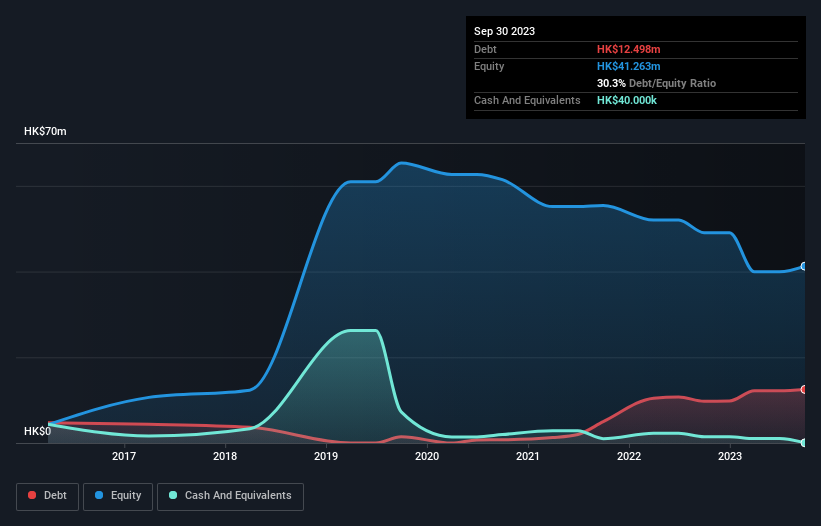Some say volatility, rather than debt, is the best way to think about risk as an investor, but Warren Buffett famously said that 'Volatility is far from synonymous with risk.' So it seems the smart money knows that debt - which is usually involved in bankruptcies - is a very important factor, when you assess how risky a company is. We note that Sun Kong Holdings Limited (HKG:8631) does have debt on its balance sheet. But is this debt a concern to shareholders?
When Is Debt A Problem?
Debt assists a business until the business has trouble paying it off, either with new capital or with free cash flow. If things get really bad, the lenders can take control of the business. However, a more common (but still painful) scenario is that it has to raise new equity capital at a low price, thus permanently diluting shareholders. Of course, the upside of debt is that it often represents cheap capital, especially when it replaces dilution in a company with the ability to reinvest at high rates of return. The first thing to do when considering how much debt a business uses is to look at its cash and debt together.
See our latest analysis for Sun Kong Holdings
What Is Sun Kong Holdings's Debt?
You can click the graphic below for the historical numbers, but it shows that as of September 2023 Sun Kong Holdings had HK$12.5m of debt, an increase on HK$9.73m, over one year. Net debt is about the same, since the it doesn't have much cash.

How Healthy Is Sun Kong Holdings' Balance Sheet?
According to the balance sheet data, Sun Kong Holdings had liabilities of HK$20.4m due within 12 months, but no longer term liabilities. Offsetting these obligations, it had cash of HK$40.0k as well as receivables valued at HK$52.7m due within 12 months. So it can boast HK$32.4m more liquid assets than total liabilities.
This surplus strongly suggests that Sun Kong Holdings has a rock-solid balance sheet (and the debt is of no concern whatsoever). With this in mind one could posit that its balance sheet means the company is able to handle some adversity. When analysing debt levels, the balance sheet is the obvious place to start. But you can't view debt in total isolation; since Sun Kong Holdings will need earnings to service that debt. So if you're keen to discover more about its earnings, it might be worth checking out this graph of its long term earnings trend.
Over 12 months, Sun Kong Holdings made a loss at the EBIT level, and saw its revenue drop to HK$88m, which is a fall of 34%. To be frank that doesn't bode well.
Caveat Emptor
While Sun Kong Holdings's falling revenue is about as heartwarming as a wet blanket, arguably its earnings before interest and tax (EBIT) loss is even less appealing. Indeed, it lost a very considerable HK$7.3m at the EBIT level. That said, we're impressed with the strong balance sheet liquidity. That should give the business time to grow its cashflow. The company is risky because it will grow into the future to get to profitability and free cash flow. The balance sheet is clearly the area to focus on when you are analysing debt. But ultimately, every company can contain risks that exist outside of the balance sheet. Case in point: We've spotted 3 warning signs for Sun Kong Holdings you should be aware of.
At the end of the day, it's often better to focus on companies that are free from net debt. You can access our special list of such companies (all with a track record of profit growth). It's free.
New: Manage All Your Stock Portfolios in One Place
We've created the ultimate portfolio companion for stock investors, and it's free.
• Connect an unlimited number of Portfolios and see your total in one currency
• Be alerted to new Warning Signs or Risks via email or mobile
• Track the Fair Value of your stocks
Have feedback on this article? Concerned about the content? Get in touch with us directly. Alternatively, email editorial-team (at) simplywallst.com.
This article by Simply Wall St is general in nature. We provide commentary based on historical data and analyst forecasts only using an unbiased methodology and our articles are not intended to be financial advice. It does not constitute a recommendation to buy or sell any stock, and does not take account of your objectives, or your financial situation. We aim to bring you long-term focused analysis driven by fundamental data. Note that our analysis may not factor in the latest price-sensitive company announcements or qualitative material. Simply Wall St has no position in any stocks mentioned.
About SEHK:8631
Yufengchang Holdings
An investment holding company, engages in the energy industry chain and e-commerce sales in mainland Chinese and Hong Kong.
Moderate risk and slightly overvalued.
Market Insights
Community Narratives




